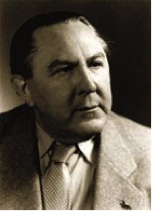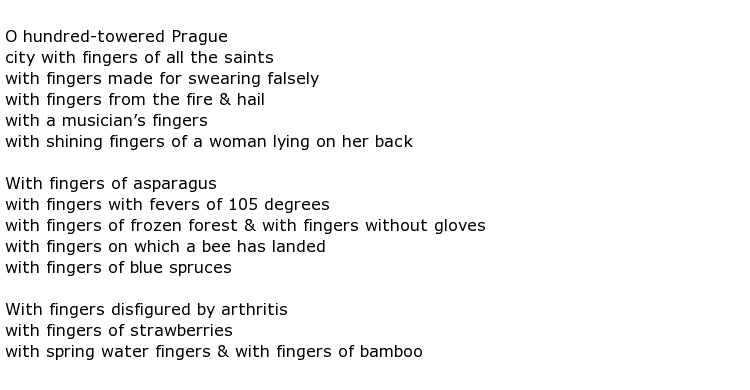 Vitezslav Nezval was a Czech born writer of the 20th century who became known as one of the leading surrealist poets of his time. During the 1920s and 1930s his writing output was considerable and he made a point of travelling to Paris as often as possible so that he could exchange his ideas with French surrealist poets. In 1934 he set up The Surrealist Group of Czechoslovakia which was a remarkable achievement in that no one had ever done that outside of France before. He was a strongly politically motivated man, believing passionately in the Communist ideals, and he risked his own liberty during the Second World War occupation of his country by the Nazis. The poetry and plays that he wrote at this time were thinly veiled attacks on the oppressors.
Vitezslav Nezval was a Czech born writer of the 20th century who became known as one of the leading surrealist poets of his time. During the 1920s and 1930s his writing output was considerable and he made a point of travelling to Paris as often as possible so that he could exchange his ideas with French surrealist poets. In 1934 he set up The Surrealist Group of Czechoslovakia which was a remarkable achievement in that no one had ever done that outside of France before. He was a strongly politically motivated man, believing passionately in the Communist ideals, and he risked his own liberty during the Second World War occupation of his country by the Nazis. The poetry and plays that he wrote at this time were thinly veiled attacks on the oppressors.
Nezval was born in the small Czech village of Biskoupky which was in the Southern Moravian area. The son of a school teacher he was encouraged in the arts and literature. At the age of 11 he became an accomplished pianist at the college, known as a gymnasium, in Třebíc. He also learned to write music here while developing his skills as a poet. He was just old enough for military service in 1918 but this was cut short by illness. After this he tried to study philosophy at the Prague Charles University but was unable to complete his studies. Perhaps, driven by his literary urges, he was spending too much time in the city’s “café society” which was full of young artists and writers at that time.
Nezval joined an “avant-garde” group of artistic types that was known as Devetsil, a group that had been formed in the city in 1920 and was home to the most influential of the Czech artists of that generation. It was a curious hybrid of ideologies. While they looked west, to France, for their avant-garde inspiration, they looked east, to Russia, for their Marxist influences. Czechoslovakia was, of course, a newly formed state in the wake of the First World War and the younger members of groups like Devetsil believed that things could be better than they were.
While some might have wavered in their Communist beliefs, people like Nezval stuck closely to a Marxist-internationalist consciousness of class solidarity. He saw in ordinary, everyday objects scope for poetic expression so might write something lyrical about a concrete building, or an aeroplane. Nezval produced a book called Abeceda, which translates to Alphabet, and his poems within focused on the forms, sounds, and functions of the alphabet. Another poem was picked up by a Czech composer and set to music – this was his 1934 piece called Sbohem a šáteček (Waving Farewell).
In his poem City of Towers he cleverly uses the image of many “fingers” to transmit to the reader the image of Prague that he sees. It is a place of many towers and monuments and it is easy to imagine slender fingers reaching up into the sky. Here is the poem:

During the Second World War Nezval risked his life to some extent, publishing staunchly patriotic poems speaking out against the Nazi occupation forces. Examples were Five Minutes from the City, The Prussians and Historical Canvas (all written in 1939). Post-war he was an active committee member of his country’s National Front party and campaigned hard for peace through socialism. Poems produced at this time included Song of Peace (1950) and Cornflowers and Cities (in 1955).
Vitezslav Nezval died in Prague in April 1958, aged 57.

